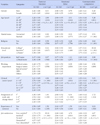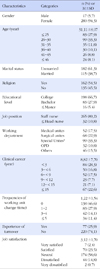Abstract
Purpose
The purpose of this study was to investigate the relationship among turnover intention, emotional labor, and communication competence in nurses.
Methods
The participants for this study were 297 nurses from three general hospitals in two local cites in Korea. Data were collected by self-administered questionnaires from August 26 to September 10, 2013 and analyzed using descriptive statistics, One-way ANOVA, t-test, Pearson Correlation, Stepwise Multiple Regression with the SPSS/WIN 18.0 program.
Results
The average scores for turnover intention, emotional labor, and communication competence respectively, were 3.45, 3.08, and 3.44 out of 5. The novices recognized that their emotional labor and turnover intention were significantly higher, and their communication competence was lower than other nurses. Nurses' turnover intention had a positive relationship with their emotional labor, but no relationship with communication competence. Job satisfaction, frequency of emotional expression, and emotional dissonance had an effect on nurses' turnover intention.
Conclusion
The results show that emotional labor and job satisfaction are very important factors affecting nurses' turnover intention. So, nurse managers should try to minimize nurses' emotional labor and maximize their job satisfaction by developing various human relationship educational and support programs and using them.
Figures and Tables
Table 3
Differences of Turnover Intention, Emotional Labor, and Communication Competence according to Characteristics of Participants (N=297)

References
1. Kang AR. Nurses' turnover ratio is 16.9%...31% of new nurses leave from hospital. Daily medi. 2014. 02. 18. sect. 10.
2. Hayes L, O'Brien-Pallas L, Duffield C, Shamian J, Buchan J, Hughes F, et al. Nurse turnover: A literature review. Int J Nurs Stud. 2006; 43(2):237–263. http://dx.doi.org/10.1016/j.ijnurstu.2005.02.007.
3. Moon SJ, Han SS. A predictive model on turnover intention of nurses in Korea. J Korean Acad Nurs. 2011; 41(5):633–641. http://dx.doi.org/10.4040/jkan.2011.41.5.633.
4. Kim MA, Park KO, You SJ, Kim MJ, Kim ES. A survey of nursing activities in small and medium-size hospitals: Reasons for turnover. J Korean Clin Nurs Res. 2009; 15(1):149–165.
5. Hochshild AR. Emotion work, feeling rules, and social structure. Am J Sociol. 1979; 85(3):551–575.
6. Baik DW, Yom YH. Effects of social support and emotional intelligence in the relationship between emotional labor and burnout among clinical nurses. J Korean Acad Nurs Adm. 2012; 18(3):271–280. http://dx.doi.org/10.11111/jkana.2012.18.3.271.
7. Yang YK. A study on burnout, emotional labor, and self-efficacy in nurses. J Korean Acad Nurs Adm. 2011; 17(4):423–431. http://dx.doi.org/10.11111/jkana.2011.17.4.423.
8. Lee HS, Kim JK. Relationship among communication competence, communication types, and organizational commitment in hospital nurses. J Korean Acad Nurs Adm. 2010; 16(4):488–496. http://dx.doi.org/10.11111/jkana.2010.16.4.488.
9. Gray B. The emotional labour of nursing: Defining and managing emotions in nursing work. Nurse Educ Today. 2009; 29(2):168–175. http://dx.doi:10.1016/j.nedt.2008.08.003.
10. Mann S, Cowburn J. Emotional labour and stress within mental health nursing. J Psychiatr Ment Health Nurs. 2005; 12(2):154–162. http://dx.doi.org/10.1111/j.1365-2850.2004.00807.x.
11. Shin MK, Kang HL. Effects of emotional labor and occupational stress on somatization in nurses. J Korean Acad Nurs Adm. 2011; 17(2):158–167. http://dx.doi.org/10.11111/jkana.2011.17.2.158.
12. Wi SM, Yi YJ. Influence of emotional labor on job satisfaction, intent to leave, and nursing performance of clinical nurses. J Korean Acad Nurs Adm. 2012; 18(3):310–319. http://dx.doi.org/10.11111/jkana.2012.18.3.310.
13. Park HJ. Emotional labour, emotional expression and burnout of clinical nurses. J Korean Acad Nurs Adm. 2009; 15(2):225–232.
14. Song YJ. A study on the effect of emotional hardship on job satisfaction and turnover of nurses [master's thesis]. Seoul: The Catholic University of Korea;2011.
15. Hyun SI. Emotional labor, emotional competence and customer-orientation in hospital nurses [master's thesis]. Seoul: Yonsei University;2008.
16. Park SH. A study on the conflict management styles, communication skills, and job satisfaction of clinical nurses [unpublished master's thesis]. Seou: Ewha Womans University;2012.
17. Hur GH. Construction and validation of a global interpersonal communication competence scale. Korean J Journal Commun Stud. 2003; 47(6):380–408.
18. Mrayyan MT, Al-Faouri I. Predictors of career commitment and job performance of Jordanian nurses. J Nurs Manag. 2008; 16(3):246–256. http://dx.doi:10.1111/j.1365-2834.2007.00797.x.
19. Shirey MR, Ebright PR, McDaniel AM. Sleepless in America: Nurse managers cope with stress and complexity. J Nurs Adm. 2008; 38(3):125–131. http://dx.doi.org/10.1097/01.NNA.0000310722.35666.73.
20. Jang JY. The relation among nurse's assertiveness, communication competence and job satisfaction, and organizational commitment [master's thesis]. Seoul: Sungkyunkwan University;2010.
21. Lee NH. The influence of nurses' organizational communication on organizational commitment and turnover intention [master's thesis]. Chungju: Korea National University of Transportation;2012.
22. Faul F, Erdfelder E, Buchner A, Lang AG. Statistical power analyses using G*power 3.1: Tests for correlation and regression analyses. Behav Res Methods. 2009; 41(4):1149–1160. http://dx.doi.org/10.3758/BRM.41.4.1149.
23. Lawler EE. Satisfaction and Behavior. In : Hackman JR, Lawler EE, Porter LW, editors. Perspectives on behavior in organization. 2nd ed. New York: McGraw-Hill;1983. p. 287–301.
24. Park HS. Relationship between perceived nursing care role orientation, job characteristics, and turnover among nurses [master's thesis]. Seoul: Yonsei University;2002.
25. Morris JA, Feldman DC. The Dimensions, antecedents and consequences of emotional labor. Acad Manage Rev. 1996; 21(4):986–1010. http://dx.doi.org/10.5465/AMR.1996.9704071861.
26. Kim MJ. Effects of the hotel employee's emotional labor upon the job-related attitudes. J Tourism Sci. 1998; 21(2):129–141.
27. Rubin RB, Martin MM, Bruning SS, Power DE. Interpersonal communication competence: Scale development and test of a self-efficacy model. Paper presented at: The Annual Conference of the Speech Communication Association. 1991 October; Atlanta.
28. Yoon GS, Kim SY. Influences of job stress and burnout on turnover intention of nurses. J Korean Acad Nurs Adm. 2010; 16(4):507–516. http://dx.doi.org/10.11111/jkana.2010.16.4.507.
29. Kim MR. Influential factors on turnover intention of nurses: The affect of nurse's organizational commitment and career commitment to turnover intention. J Korean Acad Nurs Adm. 2007; 13(3):335–344.
30. Zapf D, Holz M. On the positive and negative effects of emotion work in organizations. Eur J Work Organ Psychol. 2006; 15(1):1–28. http://dx.doi.org/10.1080/13594320500412199.




 PDF
PDF ePub
ePub Citation
Citation Print
Print






 XML Download
XML Download